
Women’s safety is not merely a matter of social justice but also a crucial economic factor influencing investment, innovation, and quality of life. Countries where women face high risks of violence, restricted mobility, and legal insecurity inevitably lose competitiveness. This is largely due to capital flight and the emigration of skilled professionals—affluent families move to countries where their loved ones feel secure, investors prefer more predictable jurisdictions, and talented entrepreneurs relocate to places where their rights are better protected.
According to the United Nations, insufficient investment in gender equality costs the global economy $10 trillion annually. In countries where women feel safe, investment levels are higher, and innovation flourishes. For example, research in India indicates that women-owned businesses are more likely to adopt new technologies, particularly in regions with low crime rates.
The Caribbean region, known for its tropical landscapes and cultural richness, presents significant contrasts in terms of women’s safety. While many nations are renowned for their hospitality, only a select few can boast a robust legal system, low crime rates, and genuine gender equality.
Among them, Dominica stands out as one of the safest destinations, providing women with an environment that combines comfort and security. What factors contribute to this reputation?

Dominica Creole Day Parade 2024
Dominica continues to enjoy relatively low crime levels, with declines in theft, robbery, and burglary reinforcing its reputation as a safe and peaceful destination. According to Numbeo, residents rate the country’s crime level as relatively low, particularly in terms of property crimes. Contributing factors include a small population, strong social ties, and a high level of community trust, fostering an environment where people actively look out for one another.
Unlike large metropolitan areas where women may experience street harassment, Dominica’s social environment is friendly and respectful. Women can walk freely, use public transport, and travel alone with less risk compared to other countries in the region.
Travel advisories from the US State Department recommend only standard precautions, reflecting stable security conditions. Meanwhile, UK and Canadian authorities advise exercising caution, particularly at night and in remote areas—standard recommendations for most countries that do not diminish Dominica’s overall perception as a safe place.
A combination of low crime rates, effective policing, and strong community collaboration makes Dominica one of the safest countries in the Caribbean. This not only enhances the quality of life for residents but also increases the island’s attractiveness to tourists and investors.
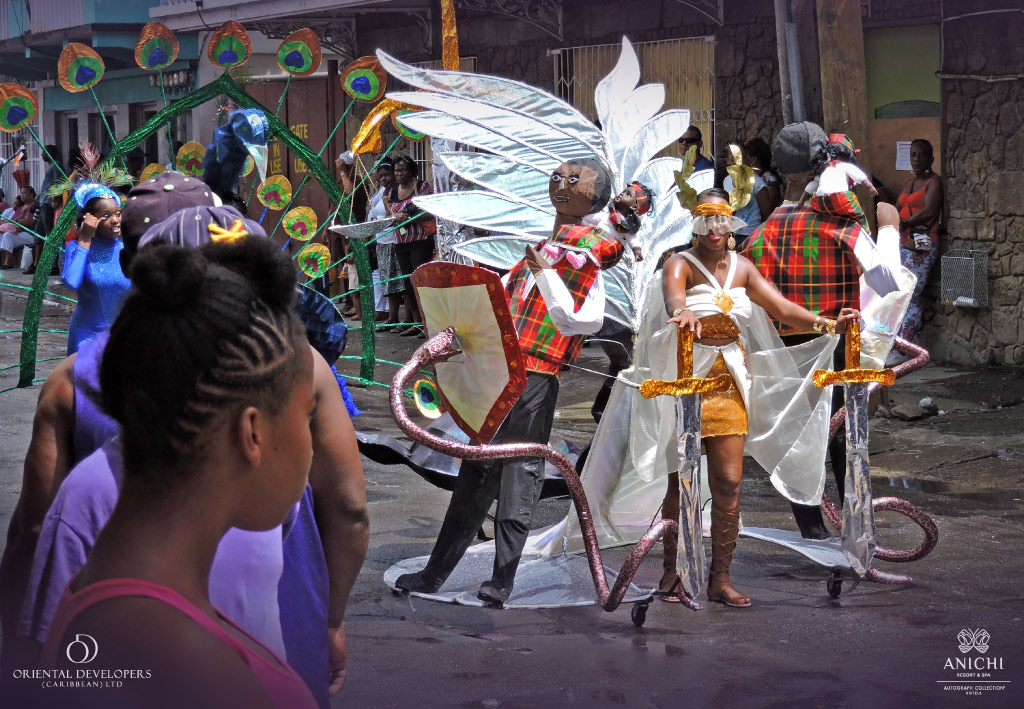
Nemesis Costume at the Carnival Tuesday Parade 2017
Dominica stands out among Caribbean nations for its progressive policies in protecting women from violence. The country has not only eliminated outdated legal barriers but also implemented effective support mechanisms for victims, reinforcing social stability and fostering economic growth.
Women’s protection in Dominica is underpinned by several legislative acts designed to prevent violence, safeguard victims, and punish perpetrators:
The Domestic Violence Act (2023) introduces comprehensive measures, including restraining orders, housing rights, and financial compensation for victims.
The Sexual Offences Act (1998, amended in 2016) imposes strict penalties for sex crimes, including rape, harassment, coercion, and child exploitation. The 2016 amendments refined definitions of sexual violence and tightened punishments for marital rape.
The Offences Against the Person Act (1990, revised) covers physical violence, including assault and bodily harm.
Common law provisions allow for civil and employment-related legal action against perpetrators of workplace violence or discrimination.
The Maintenance Act (2023) ensures financial assistance for spouses and parents, enabling women to leave economically dependent or abusive relationships without fear of destitution.
Physical violence falls under criminal law, while the Domestic Violence Act supplements it with additional safety mechanisms. While Dominica lacks a specific sexual harassment law, common law principles allow such cases to be addressed under “duty of care” obligations and employment contract violations.
Previously, judicial practice required corroborating evidence beyond a victim’s testimony for a conviction in sexual violence cases, reflecting outdated stereotypes about the reliability of women’s statements. Today, Article 28 of the Sexual Offences Act has removed this requirement, allowing a judge to rule based on a single credible witness testimony.
The Domestic Violence Act provides victims with a wide range of tools for ensuring their safety:
Protection orders prohibit aggressors from any form of harassment.
Residence orders allow victims to remain in shared homes while requiring perpetrators to leave.
Violating these orders carries severe penalties, including imprisonment.
Beyond physical safety, Dominica’s legislation offers material compensation for domestic violence victims. Women can claim reimbursement for medical expenses, lost income, and relocation costs.
Strict measures also protect victims’ privacy. Sexual offence cases can be held behind closed doors, and publishing details without court approval is punishable by fines. The disclosure of victims’ or defendants’ identities is prohibited, minimising the risk of public stigma and pressure.
Dominican police play a key role in combating gender-based violence. The law grants officers the authority to arrest aggressors without a warrant if a woman’s safety is at risk. A National Domestic Violence Registry is maintained, and emergency assistance is provided to victims, including protection for children and vulnerable groups.
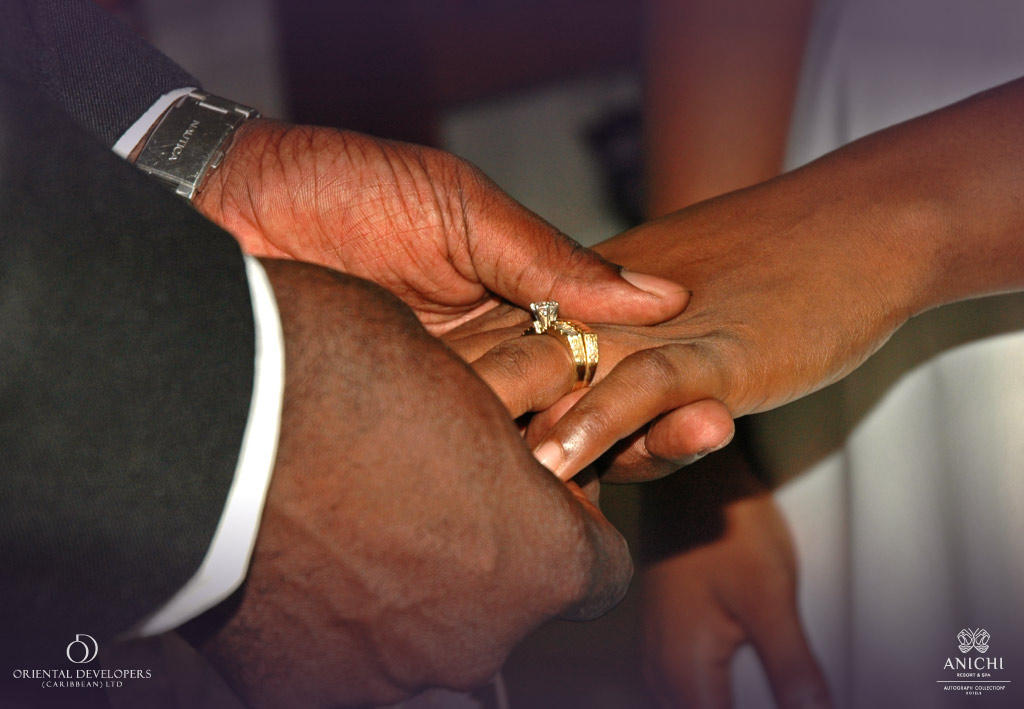
Wedding Rings Exchange Ceremony
Women can dissolve a marriage without significant legal or financial obstacles, particularly in cases of domestic violence. The country’s legislation allows for divorce on grounds of abuse, infidelity, prolonged separation, or failure to fulfil family obligations.
Courts in Dominica take women’s interests into account during divorce proceedings:
In cases of domestic violence, women can seek protection orders and legal safeguards through the courts.
Court rulings on alimony and property division consider the economic interests of women and children. Moreover, if harm from violence is proven, the court may order the perpetrator to pay compensation to the victim.
Dominica’s experience demonstrates that effective protection of women from violence is only possible through a combination of legal safeguards and financial support. This comprehensive approach not only upholds principles of justice but also strengthens socio-economic resilience. The elimination of discriminatory norms, comprehensive support for victims, and proactive policing make the country a regional leader in gender security.
Dominica places great emphasis on maternity protection and ensuring women receive high-quality medical care. The country has achieved 100% coverage of medical assistance during childbirth, guaranteeing the safety and health of mothers and newborns. Additionally, 84.7% of women undergo at least four medical check-ups during pregnancy, reducing the risk of complications and improving the standard of prenatal care. Furthermore, women have free access to modern contraception methods, helping to reduce unplanned pregnancies and enhance their social and economic independence.
Dominica is actively developing its healthcare system by ensuring equal access to medical services and improving their quality. Government programmes include modernising infrastructure, enhancing the qualifications of medical personnel, and expanding service availability for all segments of the population. These measures contribute to a reduction in maternal and infant mortality rates, strengthening the country’s status as one of the most stable in the region in terms of women’s health and safety.
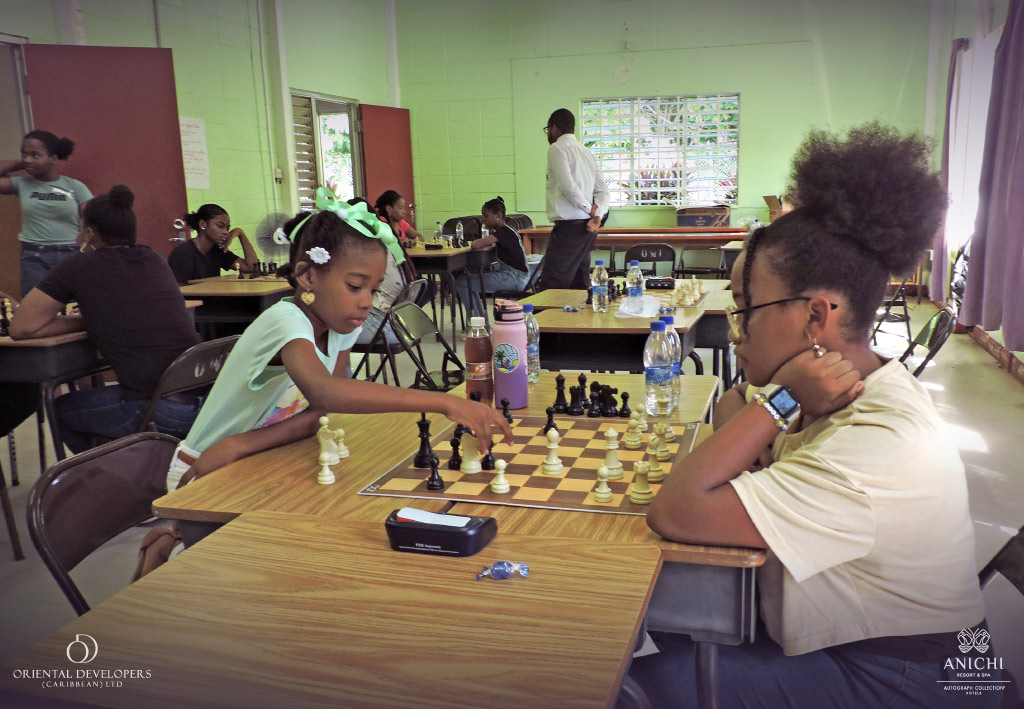
Dominica Women’s Chess Tournament 2023
Dominica is one of the few countries where gender equality has become not just an ideal but a lived reality. Women play a key role in politics, business, environmental protection, and the maritime industry, actively contributing to the country’s economic development.
Dominica has long established itself as a nation where women do not merely participate in politics but actively shape its direction. As early as 1980, Mary Eugenia Charles became the first female Prime Minister not only of Dominica but of the entire Caribbean region. She remained in office for 15 years, laying the foundation for future generations of female leaders.
This tradition continues: in 2023, Sylvanie Burton was elected President of Dominica, becoming the first woman and the first representative of the Indigenous Kalinago people to hold the position. Her election marked a significant step towards greater inclusivity and reflects the country’s sustained commitment to equality and diversity in political leadership.
Today, the legacy of pioneering women is reflected in the numbers: in 2022, women made up 40% of the Cabinet of Ministers, and by 2025, this figure is set to reach 43%. This is one of the highest levels of female political representation not just in the region but globally. According to UN Women data as of 1 January 2024, women hold an average of 23.3% of ministerial positions worldwide.
Women in Dominica are actively developing small and medium-sized businesses, moving beyond traditional industries. They work in sectors such as agriculture, tourism, retail, and technological innovation.
In agribusiness, female entrepreneurs are pioneering new approaches to processing local raw materials, transforming them into high-demand products—from organic herbal teas to natural cosmetics. These initiatives not only support local production but also help Dominica expand into international markets.
In tourism, the number of eco-conscious hotel projects led by women is on the rise. These businesses prioritise sustainable practices and promote the island’s natural heritage.
However, entrepreneurship comes with challenges. Access to finance remains limited, and the need to balance business with family responsibilities creates additional barriers. Nevertheless, microfinance programmes, business training, and mentorship initiatives are helping women overcome these difficulties, expanding their opportunities for growth.
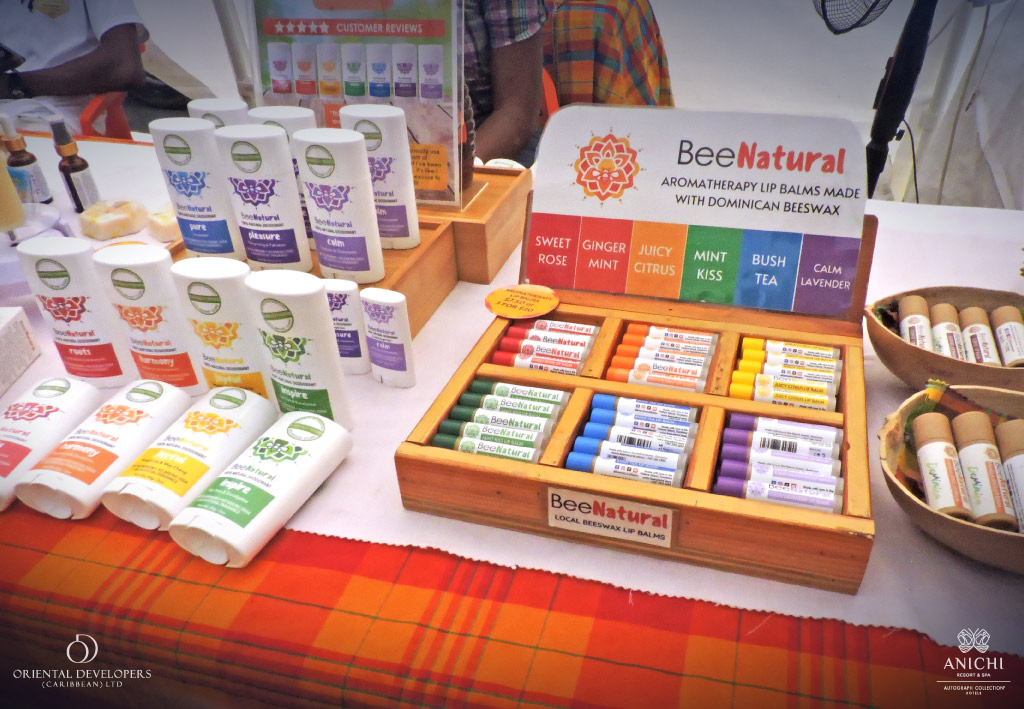
Bee Natural was founded by Terri Henry-Lovell.
Women in Dominica play a leading role in initiatives aimed at adapting to climate change and mitigating its effects. They are actively involved in developing sustainable agriculture, preserving natural ecosystems, and promoting renewable energy sources, strengthening the country’s resilience to climate threats.
The ‘Working Towards a Gender-Responsive, Climate-Resilient Dominica’ project, implemented with the support of the United Nations Development Programme (UNDP), enhances women’s economic opportunities in the most vulnerable sectors. Farmers, artisans, and fishers have gained knowledge and resources that allow them to turn challenges into new opportunities—from recycling disaster debris into marketable products to transitioning from government aid to sustainable agricultural enterprises. These initiatives not only promote women’s economic independence but also bolster the country’s ability to withstand climate change.
Women in Dominica are gradually strengthening their presence in traditionally male-dominated fields such as port management, logistics, and marine conservation. A significant step towards gender equality was the establishment of the Dominica branch of the Women in Maritime Association Caribbean (WiMAC) in 2019. With the support of the International Maritime Organization (IMO), WiMAC provides women with training, mentorship, and career advancement opportunities, helping them attain leadership roles in the industry.
Community organisations such as the Caribbean Female Empowerment Movement (cFEM) have played a crucial role in expanding opportunities for Dominican women. This organisation has created a network of professional women focused on education, leadership development, and supporting female entrepreneurship. Additionally, cFEM celebrates women who have made significant contributions to society, fostering a culture of mentorship and mutual support.
The advancement of women in Dominica is reflected in their active participation and leadership across various sectors. Government programmes, educational initiatives, and international cooperation continue to drive the growth of women-led initiatives. Access to higher education, microfinance, and mentorship expands their professional opportunities. Furthermore, support for entrepreneurship and integration into global economic projects strengthens women’s financial independence. Recognition of their achievements at both governmental and societal levels plays a key role in shaping a more inclusive and sustainable society.
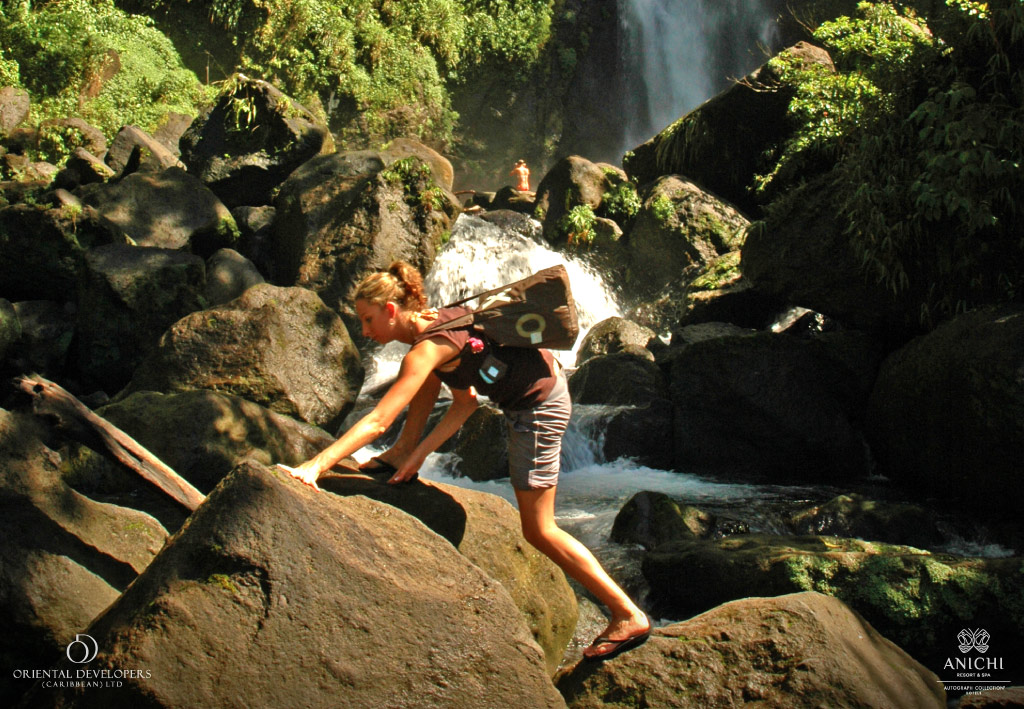
Woman Hiking in Dominica
For many years, Dominica remained in the shadow of more popular Caribbean resorts. However, it is now confidently establishing itself as a leading destination for solo travellers, particularly women seeking tranquillity and safety. Unlike islands geared towards mass tourism, Dominica offers something different—a unique combination of seclusion, authenticity, and exhilarating adventures amid stunning natural beauty. Recent international accolades only reaffirm its distinctive status.
Condé Nast Traveler included Dominica in its list of the 16 best destinations worldwide for solo female travellers, making it the only Caribbean destination in the ranking. The publication highlighted the island’s traditional Caribbean charm, independent guesthouses, and luxury eco-lodges run by locals. Unlike other popular destinations that focus primarily on romantic getaways and honeymoon resorts, Dominica is well-suited for solo adventurers. Its network of local hotels and guesthouses fosters connections with fellow travellers, creating a balance of solitude and sociability. Meanwhile, the abundance of jungle adventures adds vibrancy and excitement to the experience.
However, Dominica’s appeal extends beyond being an easy place to travel alone. It is also strengthening its reputation as a responsible tourism destination. BBC recognised it as the best place to visit in 2025, praising its commitment to marine conservation and sustainable tourism. Ethical initiatives, such as whale-watching programmes that observe sperm whales in their natural habitat, position the island as a leader in regenerative tourism. Dominica not only offers visitors unforgettable experiences but also ensures a safe and environmentally sustainable environment—an important factor for solo female travellers.
In addition, Ethical Traveler listed Dominica among the top ten most ethical destinations of 2025. This ranking evaluates countries and regions based on their commitment to human rights, environmental protection, and sustainable development. Being included in this list reaffirms that Dominica is a place where travellers can explore with confidence, knowing their visit supports local communities and the environment.
Safety remains a top priority for solo travellers, and Dominica stands out in this regard. Travel Pulse named it one of the safest destinations in the Caribbean in 2024, highlighting its low crime rates, welcoming locals, and secure adventure activities, such as jungle hikes and hot spring visits.
With the growing demand for mindful and independent travel, Dominica is at the forefront of a new tourism trend—destinations where solo travellers can explore freely without feeling alone.
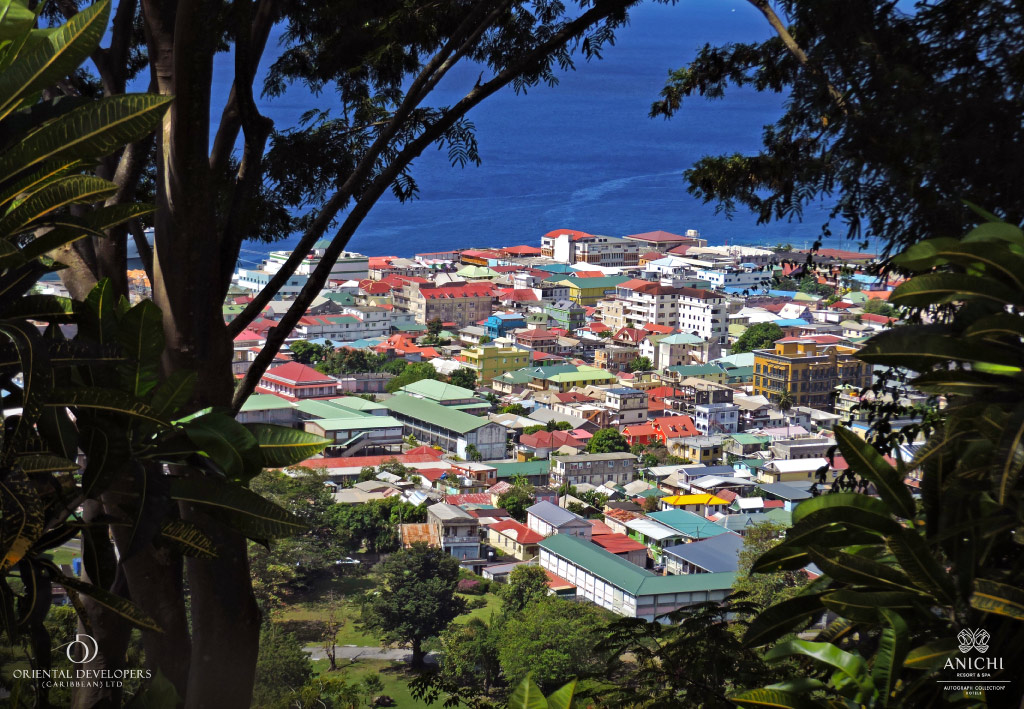
Roseau, the capital of Dominica.
Dominica serves as a prime example of how women’s safety and active participation in society can not only foster social justice but also drive economic growth. By investing in women’s rights, legal reforms, and access to healthcare, the country has created an environment of stability and prosperity. This, in turn, attracts investment, stimulates entrepreneurship, and increases tourism.
These efforts are further supported by Dominica’s unique Citizenship by Investment (CBI) programme, which offers individuals the opportunity to obtain second citizenship while investing in prospective and stable projects. Amid increasing global uncertainty, Dominica provides investors with exceptional security, low taxation, and access to Caribbean markets.
It is no surprise that Dominica continues to lead the Caribbean in safety, progressive policies, and sustainable development. It is a place where women feel protected and empowered, making it an attractive destination not only for travel but also for living, working, and investing. Looking ahead, Dominica’s achievements in gender equality, security, and sustainability will ensure it remains a key model for other nations and a strategic hub for investors seeking stability and growth opportunities.